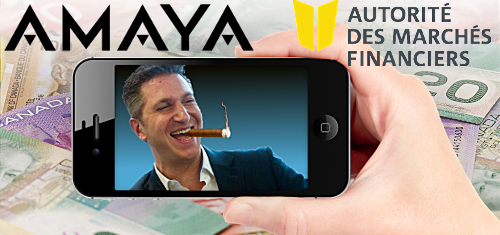 Quebec securities watchdog may have botched its insider trading investigation of Amaya Gaming‘s former CEO David Baazov by failing to secure his mobile phone in time.
Quebec securities watchdog may have botched its insider trading investigation of Amaya Gaming‘s former CEO David Baazov by failing to secure his mobile phone in time.
Tuesday saw the conclusion of two days of hearings by the Autorité des marchés financiers (AMF) into allegations that Baazpv (pictured) and a dozen other connected individuals illegally profited from stock trades based on foreknowledge of Amaya’s deals.
On Tuesday, Xavier Saint-Pierre, the AMF’s lead investigator in the Amaya case, told the hearing that when the AMF and the Royal Canadian Mounted Police seized computers and files from Amaya’s Montreal HQ in December 2014, they belated realized that they’d neglected to include Baazov’s smartphone among their booty.
By the time the AMF realized their error and went back to confiscate Baazov’s phone, they found the device had been “changed.” As quoted by La Presse, Saint-Pierre said that “the content of messages and telephone conversations could not be recovered.”
Saint-Pierre’s admission came under questioning by Baazov’s lawyer, Sophie Melchers, of Norton Rose Fulbright. Melchers also got Saint-Pierre to admit that the AMF couldn’t say if brief calls between the dozen suspects – including Baazov’s older brother Ofer/Josh and Ofer’s bookmaking partner Craig Levett – indicated that the parties had actually talked to each other or gone to voicemail.
David Baazov’s spokesman subsequently issued a statement saying the hearings were “a first step to put the record straight.” Baazov, who has pled not guilty to the charges, said he had not “received any money, gifts or other things in connection with transactions made by the respondents.” Baazpv himself said he was looking forward to “being exonerated and putting this behind me.”
The AMF’s next hearing into the Amaya affair will come on Tuesday, October 4.
OTHER PLAYERS
Saint-Pierre’s testimony also detailed the activities of two former brokers at Financière Banque Nationale (FBN), Robert Hamou and Michael Abdoo. Saint-Pierre said the pair made profits of C$90k apiece by placing short-term call options on the stock of gaming device maker WMS Industries ahead of that company’s acquisition by rival Scientific Games Corp.
According to the Canadian Press, the AMF said the call options represented a risky investment, as just three of 16 analysts gave the stock a buy recommendation at the time Abdoo and Hamou took their positions. The AMF said the pair cashed in their WMS bets the same day the acquisition was announced.
The AMF says Hamou was an adviser to Levett at the time. The AMF has previously released details on emails between Levett and Ofer Baazov following the WMS acquisition in which Levett told Ofer that “this is what we owe to your brother. I will have a check for him tomorrow.”
Three of Hamou’s other customers also bought WMS shares ahead of the acquisition, which Hamou claims were not at his recommendation but because the individuals had talked to Levett. The AMF says Abdoo claimed to have become interested in WMS after talking with Hamou.
LEVETT’S WIFE OFF THE HOOK
On Monday, the AMF decided not to continue their investigation into suspected insider trading activity by Levett’s wife, Nathalie Bensmihan.
Two months ago, a Quebec court ruled that there was no direct evidence linking Bensmihan to illegal activity and thus she should not be considered “guilty by association” based on the actions of her husband. The AMF appealed this ruling, but have now decided to leave Bensmihan out of future proceedings.
JEWISH CHARITY CLAIMS INNOCENCE
In one of the stranger aspects of this case, the AMF revealed that it seized C$87k in cash from Centre Chabad, a Jewish-run charity in Montreal, in a June 20 raid. The AMF said it suspects the money was being laundered through the Centre by some of the individuals connected with the Amaya insider trading investigation.
The money was reportedly donated to the Centre by an unidentified former Amaya consultant, who is one of the dozen individuals fingered by the AMF’s probe. The money, all of it in $20 bills, was found in the car of Rabbi Shalom Chriqui, the Centre’s director.
According to CJnews, the Centre’s lawyers have argued that since the money wasn’t found at the address listed on the search warrant, the seizure was illegal. The Centre has already filed papers seeking the return of the cash, which it claims was a combo of voluntary donations, the proceeds of a fundraising gala and candle sales.